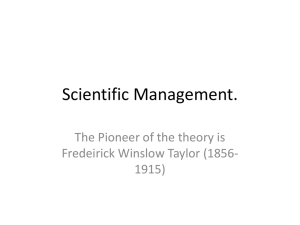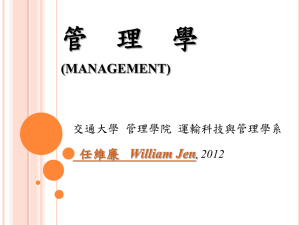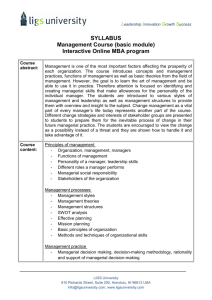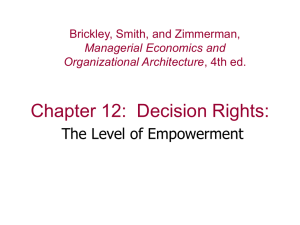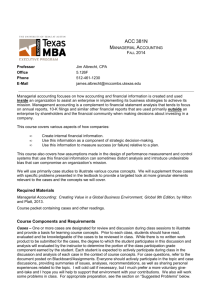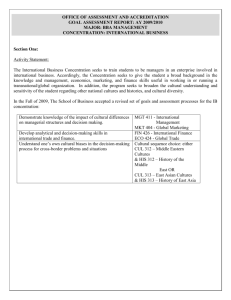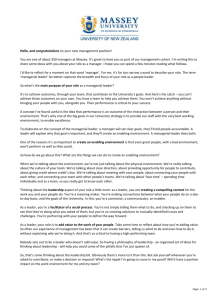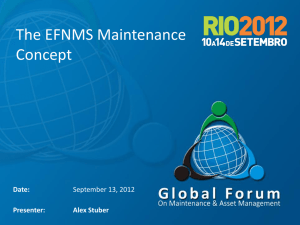The Importance Of Organizational Structure In Effective
advertisement
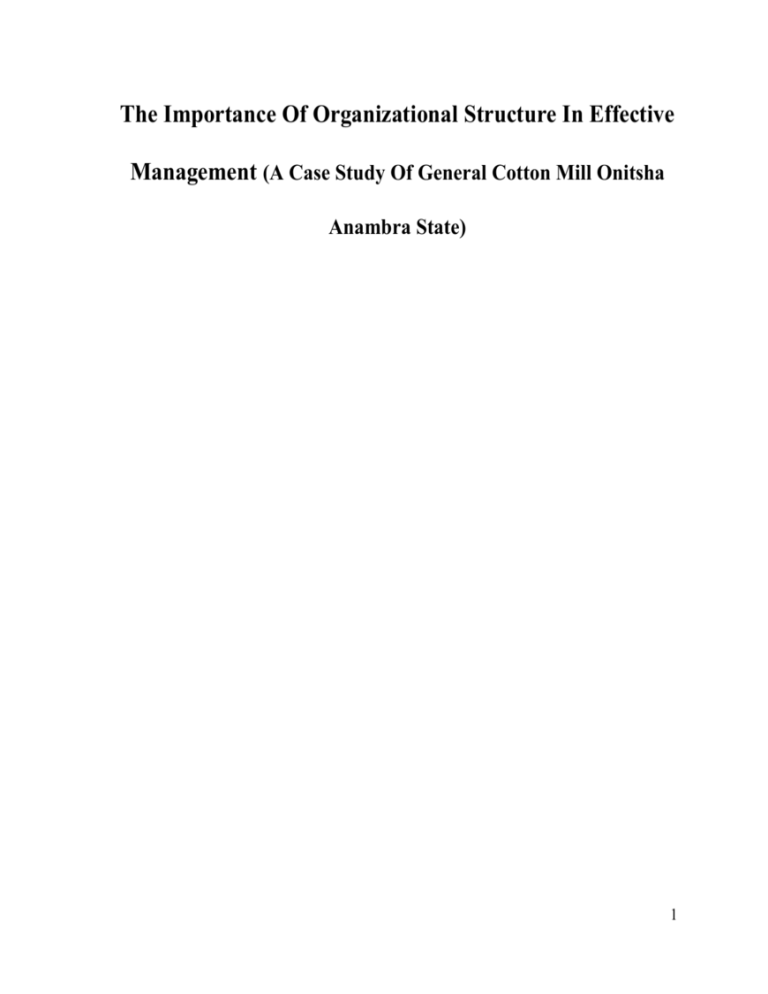
The Importance Of Organizational Structure In Effective Management (A Case Study Of General Cotton Mill Onitsha Anambra State) 1 TABLE OF CONTENT Title page Approval page Dedication Acknowledgement Abstract Table of content List of table List of figures CHAPTER ONE INTRODUCTION 1.1 Background of study 1.2 Statement of problem 1.3 Purpose of study 1.4 Research question 1.5 Research hypothesis 2 1.6 Significant of study 1.7 Scope of study 1.8 Definition of terms References CHAPTER TWO LITERATURE REVIEW 2.1 Structure 2.2 Traditional early perspective 2.3 The contingency approach 2.3.1 Enrolment and structure 2.3.2 Technology and structure 2.3.3 Element of labour 2.4 Division of labour 2.4.1 Type of structure 2.5 History of general cutting mill References 3 CHAPTER THREE RESEARCH DESIGN & METHODOLOGY 3.1 Research design 3.2 Population of the study 3.3 Sampling & sample procedure/technology 3.4 Instrumental for data collection 3.5 Validation of the instrument 3.6 Reliability of the instrument 3.7 Method of data collection 3.8 Method of data analysis References CHAPTER FOUR PRESENTATION AND ANALYSIS OF DATA 4.1 Data presentation and analysis 4.2 Presentation & analysis of data 4.3 Testing of hypothesis 4.4 Summary of result 4 CHAPTER FIVE DISCUSSION RECOMMENDATION & CONCLUSION 5.1. Discussion of result/findings 5.2 Conclusion 5.3 Implementation of research findings 5.4 Recommendation 5.5 Suggestion for further research Bibliography. CHAPTER ONE INTRODUCTION 1.1 BACKGROUND OF STUDY Every organization has objectives which has been u to achieve a goal. These objectives are identified through planning. This is simply became through planning management. Of organizations establish means of achieving objectives invariably, establishing a means for achieving these objectives becomes the prior occupation for management. 5 This bring them face to face with a major management function which is organization. The organization process is mainly aimed to achieve co-ordinate through the design of structure of task and authority relationship. Meanwhile, the level of objective attainment generally determiner the extents of management effectiveness. On the other hand, structure being a direct result of management function of organizing is the framework through which an organization accomplishes the task and responsibilities needed to attain its objectives. This may be why Donnelly et al stated that “structure is a means for achieving the goal established planning. Coming to the task that structure in the present day organization present complex relationship, is the need for people to organize their efforts on, later to attain certain objectives becomes more and more imperative. Hence organization structure defines the format allocation of work roles to identify the members to the organization. It establishes the line of authority for integrating and co-ordination activities. According to Gabraith and Nathan son, organizational structure means. “The organization of work into roles such as production, financial, marketing and so 6 on. The recombining of roles into department or division around function and product, region or market and the distribution of power across the structure. We can therefore describe the functional structure in terms of dividing tasks jobs and delegating alternatives thus these provides some aspect of major challenges faced by management, management is expected to make the appropriate analysis that will help in designing of an effective organizational structure for any total organization. A sound organizational structure activities to be directed, mottling, coordinating and control, in the overall outset of an organization and its members. Therefore it becomes a sanctioned network of interaction and relationships between position, therefore functions and occupants and also a means through which management attempt to achieve organizational goals. The foregoing emphasis the fact that structure is the result from organizational design. It could therefore be regarded as a come variable guide without which a managerial team will not function effectively. Thus, it is far from surprise that it has been the subject of intensive study for has been adopted in trying to design effective organization structure. Firstly it was the classical theorists 7 who passed the ideal of “one best way for structuring effectively organization. Unfortunately the answer provided by the decades of systematic research has proved this nation wrong organizations falls such a wide range of internal and external conditions that there cannot be a single structure or design that will prove successful for all. Thompson, has confirmed that ideal of stating that, The best organizational structure is the one that test for the from situation at moment. As this basic fact has become increasingly apparent, a new perspective on organizational design known as the contingency approach has taken forms. Supports of this approach reasons that there is, in fact no best singe structure. People and environment in the above factor function with the key dimensions of organization structure, which include departmentation. Chain of commands span of control centralization cons version staff complexity. The above facts, present a lot of challenges for modern managers. Prescribing a successful organization at structural agreement not only with the external environment. Unless, researches are therefore carried out I order to involved radiated recommendations are effective in practice, to that extent could management of such organization achieving their objective. 8 1.2 STATEMENT OF THE PROBLEM. Recent change in the business environment of Nigeria companies have given rise to high level of uncertainties, they make adjustment in the organizational structure. Since the structural variable could influence changes on the organizational effectiveness. But unfortunately there is no formula for determining the structural dimensions that should be used in a particular organization so that problems to be addressed will include. 1. Determining if a significant relationship exist between some of the Different dimension of organizations of organizational structure and managerial effectiveness. 2. Whether, there are substantial different in the way different departments within the organization are being structured. 3. If there is, does it correlate to the different levels of education acquired by subordinate with in these department. 4. Is high degree of formulization capable of preventing inappropriate reaction in the work place? 5. If yes, is there a significant between the proportions of those who believe that in the different department. 9 1.3 OBJECTIVES OF THE STUDY. This study is to examine the relationship among some element of organizational structure and managerial effectiveness in Nigeria business organization. Therefore it will like to: 1. Identify factors in the organizational structure that could affect managerial effectiveness 2. To determine whether there is problem in the structural design of the department within the organization. 3. To find out if the level of education of subordinate influence the way a manager structures his department 4. To identify the links between the above variable and the manager degree of effectiveness in meeting up to the objectives he is expected to achieve. 5. Determine whether those variable have the same or different effects on managerial effectiveness in the different department. Many aim at discovering some of the inappropriate structural variable adopted within the company that could lead to high cost of protection. Has employee 10 satisfaction poor profit deceasing rate of return or seen to identify and liquidation and to finally making proposition for a better structure that should be put on laces. 1.4 RESEARCH QUESTION Focusing on the aspect of the problem as identify in the statement of problem, the questions that arises are? 1. What relationship exists between different dimensions of organizational structure that can affect managerial efficiency? 2. What is the degree of different existing between the structural designs of the department within the organization? 3. The level of education of the subordinates affects or influence the way a manager structure his department 4. What are the links between the above variable and managerial degree of effectiveness in meeting up to the objectives he is to achieve? 5. Does the same variable have some or different effects on managerial effectiveness of other organization? 11 1.5 HYPOTHESIS To guide the investigation of the issue raised in the problem definitions, t is hypothesized that Ho: There is no much significant on the job performance and organization Hi: There is significant different between the respondent on the production department who believe that high degree of formulization is capable of preventing appropriate action on the war place and those who believe the same in the department. Ho: There is no significant different between the scope of job performance. Hi: There is significant different between the respondents in other department on the degree of work satisfaction. 1.5 SIBNIFICATION OF THE STUDY Proper organizational structure in the organization will reduce role conflicts and avoid stress to manager, it will also specify span of control. The study will help many corporate organizations that will go through the work in adopting a sound or proper organizations which will enable them achieve their set objectives. It will also specify the roles the work flows and flow of authority 12 or responsibility from top to the bottom of the organization, this reducing stress and job dissatisfaction among some officials. It will encourage, job implication in the organization and easy job analysis. There research, will also help top management during job evaluation and performance appraisal. 1.6 SCOPES OF THE STUDY Due to the nature of this research, it will not be feasible to study the influence of all the structural variable that could affect managerial effectiveness hence, only some of them will be covered in this study. The study is also counted to only my focal terms that dictatorial will be mutinously encountered in this study. 1.7 LIMITATION OF THE STUDY Owing to time factor, academic stress and lack of financial support, limited books were consulted in the study and support of general cotton wills Onitsha were consulted. 13 The researcher was also constrained by limited will structured organization in Anambra state where adequate and complete information on organizational structure will be ascertained in defining the problems and prospects that faces the department. 1.8 DEFINITION OF TERM 1. Organizational structure: Refers to the train work through which an organization accomplishes the task and responsibly needed to attains its objectives and goal. 2. Organization design: The field concerned with identifies basic principle that determines the organizational structure of any business organization in relationship to the demand of technology and environmental goal. 3. Technology: this is the conversion process used by7 an organization to transform an inputs into output. 14 4. Environment: Refers to those elements institution, organization etc whose requiring effect the performance of an organization is not subject to the organization. Hence the organization must adopt or adjust to their demand. 5. Centralization refers to the degree number of key persons 6. Formularization is the extent to which the behavior and responsible of in directed holding specific jobs are describes in written rules. 7. Coordination: The process of creating an effective links between the components proves of organizational structure which resulted from departmentalization. 8. Authority: Is the right to act. It is negative power netted in a particular person or position and accepted as appropriate and recognized as legitimate not only by the power welder bet also by those over whom was wiled. 9. Strategy: The basic goal and objective of action chosen to reach those goals and objective and the allocation necessary for carring out those goals. 15 16 REFERENCE James H. Donnelly, Jane L. Gibson John (1998) Fundamentals of Management. BNG Publishers INC. Home Wool. John Child, (1997) Organization A Guide to Management and Administration Harpers N. Y. J.P Galbraith O. A Nathason (1978) (1994) Business Policy Goshen Akwa. Rita Ejiofor (1989) Fundation of Administration African Pub. Ibadan. 17 *** INSTRUCTIONS *** Please Read The Below Instructions Carefully. ****************************** HOW TO ORDER THIS COMPLETE MATERIAL If you want to order the complete materials (Chapter One to Five, Including Abstract, References, Questionnaires, Proposal (where applicable)) of the above mentioned topic, please visit www.freeplace.org and click on “Order” (i.e. www.freeplace.org/order) ****************************** HOW TO BECOME OUR PARTNER To become our partner, visit www.freeplace.org and click on partnership. ****************************** TERMS OF USE This Material is for Academic Research Purposes only. On no account should you copy this material word for word. Copying this material “Word for Word” is against our “Terms of Use”. That you ordered this material shows you have agreed Our ‘Terms of Use’. ****************************** 18 Better is not good enough, the best is yet to come! Endeavour to be the best!! 19


